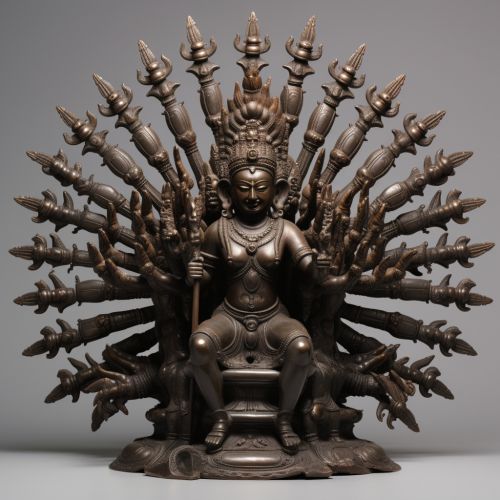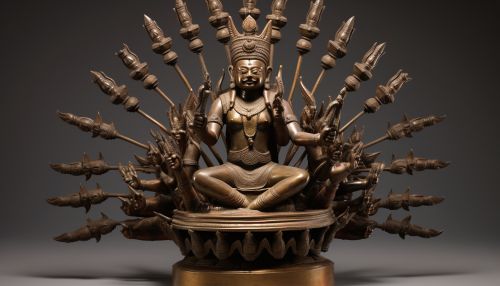Ravana
Origins and Mythology
Ravana, also known as Dashanana, is a significant figure in Hindu mythology, particularly in the epic Ramayana. He is depicted as the king of Lanka and the primary antagonist of the epic. Ravana is known for his wisdom, scholarly knowledge, and his devotion to Lord Shiva.
Ravana was born to the great sage Vishrava and his wife, the daitya princess Kaikesi. He had two brothers, Kumbhakarna and Vibhishana, and a sister named Shurpanakha. His paternal grandfather was the sage Pulastya, one of the ten Prajapatis or mind-born sons of Brahma and one of the Saptarishi (Seven Great Sages Rishi) in the first Manvantara.


Ravana's Reign
Ravana's reign is often described as a period of prosperity and justice. Despite his antagonistic role in the Ramayana, Ravana is also considered a symbol of knowledge and power. He is said to have ruled Lanka for many years, during which he not only increased its wealth and prosperity but also maintained a high level of order and justice.
Ravana was a scholar of the Vedas and the arts. He is credited with the composition of the Ravana Sanhita, a book on Hindu astrology, and the Arka Prakasham, a book on Siddha medicine and treatment. He is also said to have possessed knowledge of political science and other royal knowledge.
Ravana's Devotion to Shiva
Ravana is known for his intense devotion to Lord Shiva. It is said that he composed the Shiva Tandava Stotram, a hymn in praise of Shiva's cosmic dance, the Tandava. This hymn is considered one of the most powerful stotras in Hinduism.
Ravana's devotion to Shiva is also evident in his attempt to lift Mount Kailash, the abode of Shiva. This act of arrogance angered Shiva, who pressed down the mountain with his toe, crushing Ravana's arm. This incident led to Ravana being known as 'Ravana of the Loud Cry', as his cries of pain were said to be heard across the world.
The Abduction of Sita and the Ramayana
The most well-known story involving Ravana is his abduction of Sita, the wife of Lord Rama, which is the central event of the Ramayana. Ravana abducted Sita to avenge the insult of his sister, Shurpanakha, by Rama and his brother Lakshmana. This act led to a great war between Rama and Ravana.
Ravana was a formidable warrior and had received a boon from Brahma that he could not be killed by gods, demons or spirits. It was only a human who could slay him, and Rama, being an avatar of Vishnu, was able to do so.
Death and Legacy
Ravana's death marked the victory of good over evil. Despite his negative portrayal, Ravana is also revered for his knowledge and devotion to Shiva. In certain parts of India, he is worshipped as a deity. The annual festival of Dussehra, which celebrates the victory of Rama over Ravana, involves the burning of effigies of Ravana, symbolising the destruction of evil.
Ravana's legacy continues to be a subject of interest and study. His character represents the complexities of human nature and the consequences of letting desire and pride cloud one's judgement.
